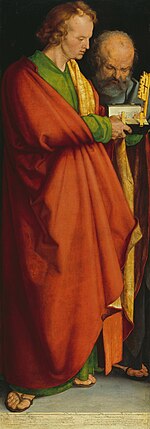Loading AI tools
The Four Apostles is a panel painting by the German Renaissance master Albrecht Dürer. It was finished in 1526, and is the last of his large works. It depicts the four apostles larger-than-life-size. The Bavarian Elector Maximilian I obtained The Four Apostles in the year 1627 due to pressure on the Nuremberg city fathers. Since then, the painting has been in Munich, in the Alte Pinakothek, and, despite all the efforts of Nuremberg since 1806, it has not been returned to Dürer's hometown.
The Four Apostles, Albrecht Dürer, 1526. Each panel 215 cm × 76 cm (85 in × 30 in), oil on lindenwood. Alte Pinakothek, Munich.
| External videos | |
|---|---|
 | |
Saints John and Peter are depicted in the left panel; the figures in the right panel are Saints Mark and Paul. The former are shown reading from the opening page of John's own Gospel, and the latter both appear alert, however only Paul, the father of Theology, seems to have recognized the spectator. At the bottom of each panel, quotations from the Bible are inscribed.[1]
The apostles are recognizable by their symbols:
- St. John the Evangelist: open book
- St. Peter: keys
- St. Mark: scroll
- St. Paul: sword and closed book
They are also associated with the four temperaments:
- St. John: sanguine
- St. Peter: phlegmatic
- St. Mark: choleric
- St. Paul: melancholic
The Four Apostles was created during the Reformation, begun in 1517 and having the largest initial impact on Germany. Some Protestants believed that icons were contradictory to the Word of God, which was held in the utmost supremacy over, thus some Protestant churches would not patron any sacred art. Many aspects of the image depicted prove significant in light of the Reformation itself.[1] Durer placed Peter, often held as the symbol of the papacy, behind John the Evangelist. Both men read from the Scriptures, which Luther upheld as the sole authority for doctrine in the Church. Durer also placed quotations from Luther's translation of the German New Testament on the panel beneath the Apostles.[2]
This painting has had many speculations as to Durer's intentions, one being that it was his way of creating a sort of worthy legacy piece.[3] When Dürer moved back to Nuremberg he produced many famous paintings there, including several self-portraits. He gave The Four Apostles to the town council.
- List of paintings by Albrecht Dürer
- Portrait of Jakob Muffel - A Dürer painting of the same year
Wikiwand in your browser!
Seamless Wikipedia browsing. On steroids.
Every time you click a link to Wikipedia, Wiktionary or Wikiquote in your browser's search results, it will show the modern Wikiwand interface.
Wikiwand extension is a five stars, simple, with minimum permission required to keep your browsing private, safe and transparent.

